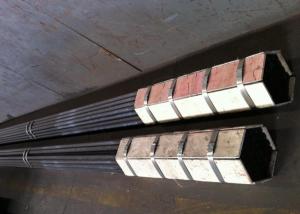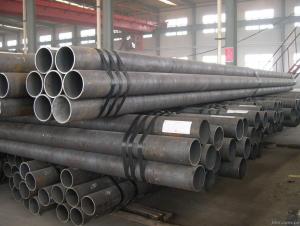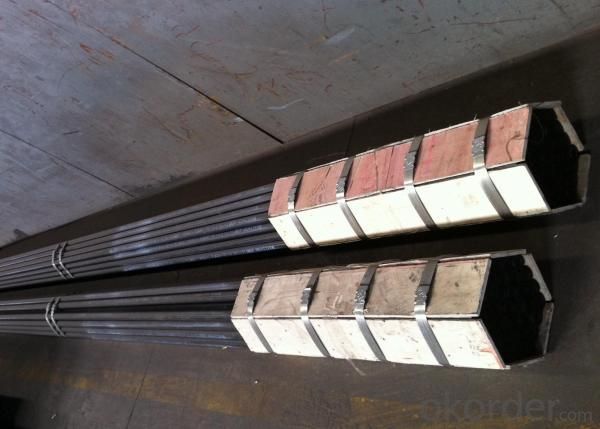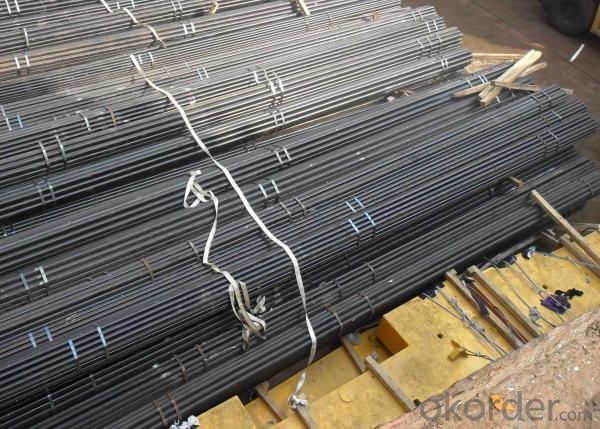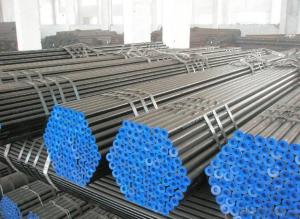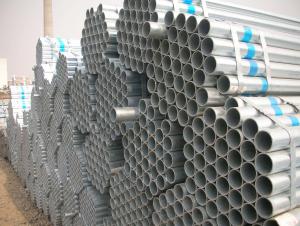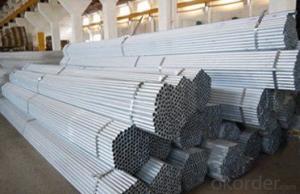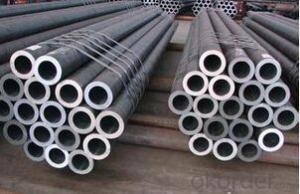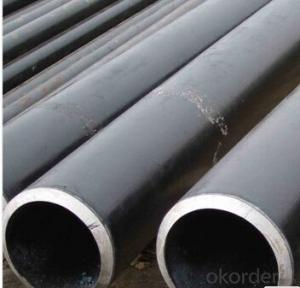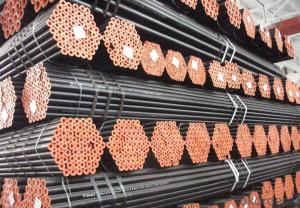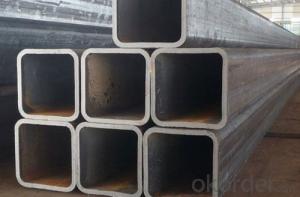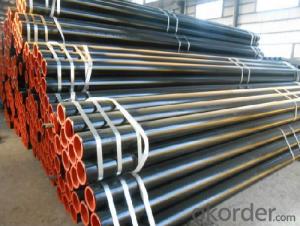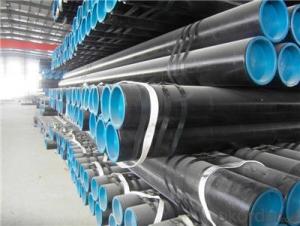Seamless Steel Tubes And Pipes For Low And Medium Pressure Boiler
- Loading Port:
- China Main Port
- Payment Terms:
- TT or LC
- Min Order Qty:
- 50 MT m.t.
- Supply Capability:
- 5000 Tons Per Month m.t./month
OKorder Service Pledge
OKorder Financial Service
You Might Also Like
Usage/Applications: For manufacturing、heating-pipeliners、containers、steaming pipeliners of low/medium pressure boilers(P<5.88Mpa,T<450℃) Packaging & Delivery: Each bundles pipes will be bundled with 6-8 pcs steel strips and with shipping marks and 2 nylon strips 40-50 days delivery on china port upon receiving orinigal LC or prepayment. | |||||||||||||||||||||||||||||||||||||||||||||||||||||||||||
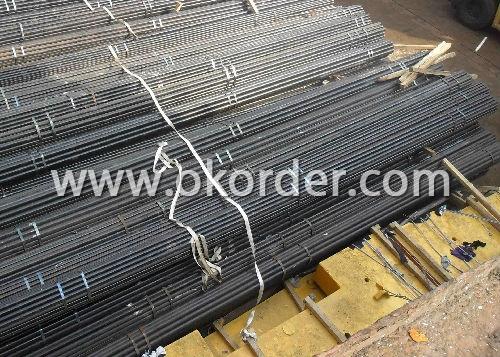
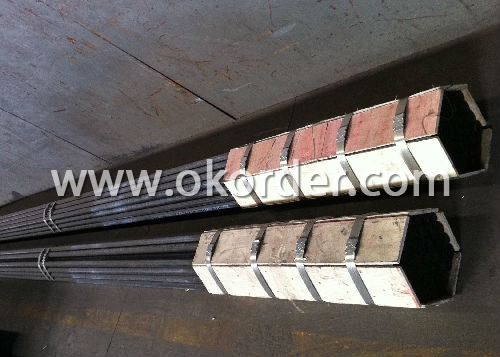
- Q: What is the average lifespan of steel pipes in different applications?
- The average lifespan of steel pipes in different applications can vary significantly depending on factors such as the type of application, the environment it is exposed to, and the level of maintenance. However, in general, steel pipes can last anywhere from 20 to 100 years or more, making them a durable and reliable choice for various industries and infrastructure projects.
- Q: What is the diameter of the steel tube DN20?
- Stress: the nominal diameter is not the outer diameter of the pipe, nor the inner diameter of the tube. It is not the average value of the inside and outside diameter (the nominal diameter of the equipment refers to the outer diameter).
- Q: How are steel pipes recycled?
- Steel pipes are recycled through a multi-step process that involves collection, sorting, cleaning, and melting. First, the used steel pipes are gathered from various sources such as construction sites or industrial facilities. Then, they are sorted based on their size, shape, and quality. Next, any contaminants or coatings are removed from the pipes through cleaning and stripping processes. Finally, the cleaned pipes are melted down in a furnace, and the molten steel is formed into new pipes or other steel products. This recycling process reduces the demand for new raw materials and helps conserve energy and resources.
- Q: How are steel pipes installed underground?
- Steel pipes are installed underground through a process called trenching, where a trench is dug in the ground according to the desired pipe route. The trench is then prepared by removing any hindrances and ensuring a level base. The steel pipes are laid into the trench, with proper alignment and connections between sections. Once in place, the trench is backfilled with soil, compacted, and any necessary restoration work is done on the surface.
- Q: How are steel pipes insulated for thermal purposes?
- Various methods are commonly employed to insulate steel pipes for thermal purposes. One method frequently utilized involves wrapping the pipes with insulation materials like fiberglass, mineral wool, or foam. These materials act as a barrier between the pipe and its surroundings, effectively preventing heat transfer or loss. To ensure the proper insulation of steel pipes, the insulation material is typically tightly wrapped around the pipe, leaving no gaps or openings for heat to escape. Adhesive tapes or metal bands are then used to secure the insulation in place. In addition to external insulation, internal insulation can also be applied to steel pipes. This involves placing insulation material inside the pipe, creating a protective layer against heat loss or gain. Internal insulation is commonly utilized in situations where the pipe carries hot fluids or gases. Moreover, certain steel pipes are designed to incorporate a built-in insulation layer. These pipes, known as pre-insulated pipes, already come equipped with insulation material integrated into their structure. The insulation layer is typically made of foam or mineral wool and is covered with a protective outer layer, ensuring effective thermal insulation. The insulation of steel pipes for thermal purposes plays a critical role in various industries, including oil and gas, HVAC, and plumbing. Proper insulation helps to maintain the desired temperature of fluids or gases flowing through the pipes, preventing energy loss and enhancing overall efficiency.
- Q: How do you calculate the deflection of a steel pipe?
- To determine the deflection of a steel pipe, one must take into account various factors, including material properties, applied loads, and geometrical characteristics. The following steps can serve as a guide: 1. Material properties must be determined. This involves obtaining information about the steel pipe, such as its Young's modulus (E), which signifies its stiffness or resistance to deformation. Typically, this value is provided by the manufacturer or can be found in material databases. 2. The applied loads need to be analyzed. It is necessary to identify the types and magnitudes of the loads acting on the steel pipe. These loads can consist of point loads, distributed loads, or a combination of both. Additionally, the location and orientation of the applied loads must be determined. 3. The geometry of the pipe must be evaluated. The dimensions of the steel pipe, including its length (L), outer diameter (D), and wall thickness (t), should be measured or obtained. Accuracy in these values is crucial for precise calculations. 4. An appropriate calculation method should be selected. Depending on the complexity of the loading and support conditions, one may need to employ either simple beam theory or more advanced structural analysis methods, such as the finite element method (FEM). 5. The relevant equations must be applied. For simple beam theory, the Euler-Bernoulli beam equation can be utilized to calculate the deflection at a specific point on the pipe. This equation assumes the pipe is homogeneous, linearly elastic, and subjected to small deflections. In more complex scenarios, FEM software can handle the calculations. 6. Boundary conditions must be determined. The support conditions at both ends of the pipe, which can include fixed supports, simply supported ends, or combinations of both, need to be identified. These conditions significantly influence the deflection of the pipe. 7. The deflection can be calculated. By using the equations relevant to the chosen method and incorporating the material properties, applied loads, and geometry, one can calculate the deflection at specific points along the steel pipe. The deflection can be measured in terms of vertical displacement or angular rotation. It is important to note that calculating the deflection of a steel pipe may require specialized engineering knowledge and software tools. If one lacks experience in structural analysis, it is advisable to consult a professional engineer to ensure accurate results and safe design.
- Q: How do you protect steel pipes from fire?
- One way to protect steel pipes from fire is by applying a fire-resistant coating or insulation. This can help prevent the pipes from reaching the critical temperature where structural integrity is compromised. Additionally, installing fire rated enclosures or barriers around the pipes can provide an extra layer of protection. Regular inspections and maintenance are also crucial to ensure any potential fire hazards are identified and addressed promptly.
- Q: Can steel pipes be used for underground fuel storage systems?
- Yes, steel pipes can be used for underground fuel storage systems. Steel pipes are commonly used for underground fuel storage due to their durability, strength, and resistance to corrosion. Additionally, steel pipes can be easily welded and sealed, ensuring a secure storage system for fuels.
- Q: What is the difference between schedule 10 and schedule 40 steel pipes?
- Schedule 10 and schedule 40 steel pipes find common usage in various industries for different purposes, differing in their wall thickness and pressure ratings. When it comes to wall thickness, schedule 10 pipes possess a slimmer wall in comparison to schedule 40 pipes. This attribute results in schedule 10 pipes having a smaller internal diameter and the ability to withstand lower pressure compared to schedule 40 pipes. While schedule 10 pipes typically have a wall thickness of 0.109 inches, schedule 40 pipes boast a wall thickness of 0.154 inches. The thinner walls of schedule 10 pipes make them ideal for applications with low pressure, such as domestic water supply, drainage systems, and general plumbing. Additionally, they are frequently employed in lightweight structures or where weight is a significant concern. On the other hand, schedule 40 pipes are specifically designed to handle higher pressure and are commonly utilized in industrial settings. These pipes are often found in applications such as oil and gas pipelines, chemical processing plants, and high-pressure fluid systems. The thicker walls of schedule 40 pipes provide them with enhanced strength and durability, enabling them to withstand higher pressure and stress. To summarize, the primary distinction between schedule 10 and schedule 40 steel pipes lies in their wall thickness and pressure ratings. Schedule 10 pipes have a thinner wall and are suitable for low-pressure applications, while schedule 40 pipes possess a thicker wall and can withstand higher pressure. It is crucial to select the appropriate schedule based on the specific requirements and pressure limitations of the intended application.
- Q: How are steel pipes used in geothermal energy systems?
- Steel pipes are commonly used in geothermal energy systems to facilitate the transport of fluids, such as water or steam, between the geothermal source and the power plant. These pipes are designed to withstand high temperatures and pressures, ensuring the safe and efficient transfer of geothermal fluids. Additionally, steel pipes are used in the construction of geothermal wells, providing structural support and maintaining the integrity of the wellbore.
1. Manufacturer Overview
| Location | Wuxi, China |
| Year Established | 1991 |
| Annual Output Value | 300,000Tons |
| Main Markets | Europe; Southeast Asia; etc. |
| Company Certifications | API 5L;API 5CT;API Q1;ISO/TS29001 |
2. Manufacturer Certificates
| a) Certification Name | |
| Range | |
| Reference | |
| Validity Period |
3. Manufacturer Capability
| a) Trade Capacity | |
| Nearest Port | Wuxi; Shanghai |
| Export Percentage | 41% - 50% |
| No.of Employees in Trade Department | 3900-4000 People |
| Language Spoken: | English; Chinese; Spanish |
| b) Factory Information | |
| Factory Size: | Above 450,000 square meters |
| No. of Production Lines | Above 10 |
| Contract Manufacturing | OEM Service Offered;Design Service Offered |
| Product Price Range | Average |
Send your message to us
Seamless Steel Tubes And Pipes For Low And Medium Pressure Boiler
- Loading Port:
- China Main Port
- Payment Terms:
- TT or LC
- Min Order Qty:
- 50 MT m.t.
- Supply Capability:
- 5000 Tons Per Month m.t./month
OKorder Service Pledge
OKorder Financial Service
Similar products
Hot products
Hot Searches
Related keywords
